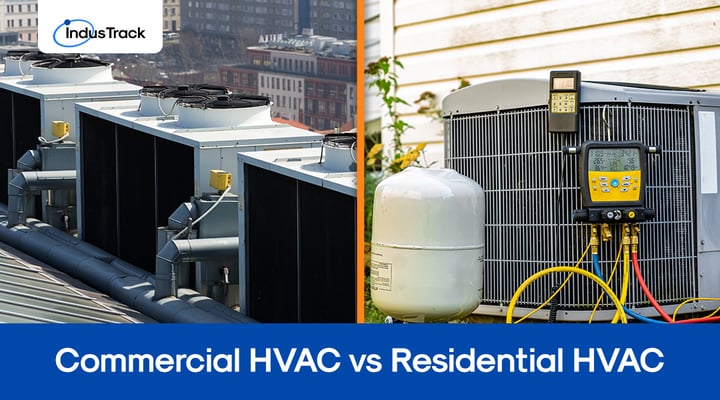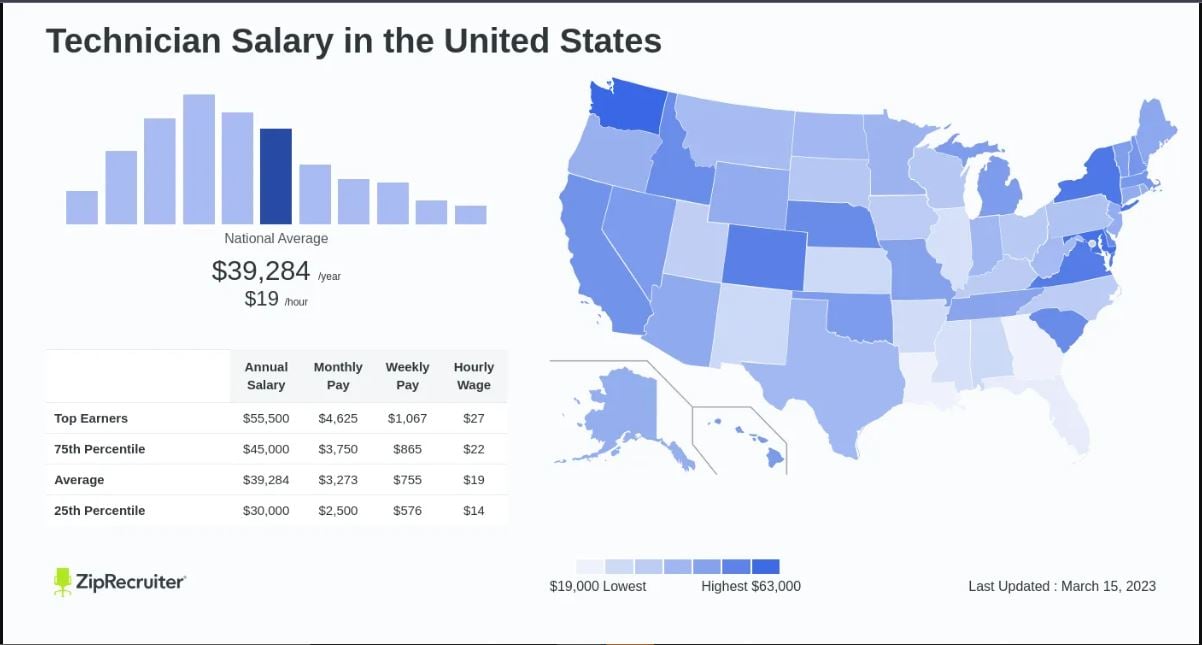
The HVAC industry in the United States is experiencing significant growth, with heating and cooling service providers expected to make around $123 billion in revenue in 2023. Over the next five years, experts predict a steady 6.6% industry growth, catering to both commercial and residential HVAC customers. The focus on either residential or commercial clients plays a crucial role in shaping the business model of HVAC service providers.
When it comes to residential HVAC, technicians primarily deal with the heating and cooling systems of everyday homeowners. On the other hand, commercial HVAC technicians focus on servicing systems for businesses, malls, offices, and public spaces. Despite the common thread of servicing, installing, and repairing heating and cooling equipment, the unique aspects of where and how these technicians operate set the two positions apart.
In this article, we'll talk about the distinctions between commercial HVAC and residential HVAC, exploring variations in the nature of their work, profit potential, and more.
What Is the MAJOR Difference Between Commercial and Residential HVAC?
Residential and commercial HVAC services differ mainly in the types of systems they handle. Commercial systems are bigger and more complex, often with a central plant containing various components like boilers, cooling towers, and ventilation systems. In contrast, residential systems are simpler, usually consisting of a standalone unit, like a gas furnace.
Commercial HVAC companies focus on serving businesses and industrial facilities, ranging from apartment complexes to hospitals. They deal with larger and more specialized heating or cooling equipment designed to manage entire buildings.
In contrast, residential HVAC providers primarily cater to homes but might also serve small businesses with residential-style systems, like those found in local shops or offices. So, even if you're in residential HVAC, you may still have business clients relying on similar systems.
READ MORE: Essential Toolkit for Commercial Contractors to Boost Productivity
There's a noticeable difference between commercial and residential HVAC services, especially in the actual work and expertise needed. Let's dive a bit deeper into how these services vary.
Commercial vs. Residential HVAC Installation
Residential and commercial HVAC installations are two different beasts. The extent of the work and materials you need will be quite different. This will affect how you price your services and how long a job will take.
The scope of work and materials involved varies significantly, in both residential and commercial HVAC, influencing how you determine service costs and estimate the time needed for a job.
Commercial HVAC Installation |
Residential HVAC Installation |
|
Commercial installation projects typically take a lot more time compared to residential ones—often stretching across several weeks. Planning these installations requires careful consideration, especially when deciding how to arrange different units. Commercial HVAC systems have a bigger job, needing to heat or cool much larger spaces. Depending on the building layout, it might make sense to go for a multi-zone system or larger units. Now, where these systems are placed is another difference. For commercial setups, technicians usually put the units on the roof. Why? Well, these systems are bigger, so there's not much space outside. Plus, they tend to be louder. To avoid bothering people with the noise, they stick them on the roof, making it less likely to disturb anyone. Overall, the installation process is more intense for commercial HVAC systems. |
For a residential HVAC company, getting a unit up and running is a quicker job for your technicians. It usually takes a few hours to a couple of days. Putting in residential HVAC gear is pretty straightforward. You'll find units in the yard, next to the building, or in the basement or attic for heating systems. Most jobs only need one or two technicians. For instance, two licensed technicians can set up a new gas furnace in just an afternoon. If it's a brand-new central AC system and you're also putting in new ductwork, it might take three days or more. But if it's just connecting a new air conditioner to existing ductwork, a few hours could do the work. Residential providers tend to serve more customers in less time because the work isn't as big as it is for commercial systems. With that, there also comes a major difference in wages for both commercial-level and residential-level technicians. Let’s cover it later. |
Commercial vs. Residential HVAC Repair
Repair work will also be different for residential and commercial HVAC systems. But this likely comes as no surprise to you.
Commercial HVAC Repair |
Residential HVAC Repair |
|
A commercial HVAC company often needs to send repair technicians more frequently. For instance, the HVAC system in a data center runs all the time due to constant server activity. To prevent overheating, ongoing AC and ventilation are crucial. Components are likely to break down occasionally as a result, a situation less common in residential units. Commercial HVAC customers may be more careful about system breakdowns since it could impact their business. So, it makes sense to have commercial technicians available for emergency repairs, even outside regular business hours. Commercial repairs usually involve contractors sending out service agreements. These agreements state that regular maintenance sessions will occur regularly. The goal is to prevent more expensive repairs in the long run. |
Repairs for residential HVAC systems, much like installations, are simpler tasks. This means your team can wrap them up more quickly. As a result, the repairs likely won't be as pricey or time-consuming as the ones for commercial systems. This leaves you with more time for other services or to take on additional repair customers. Emergency repairs are part of the deal with residential HVAC services too. However, unlike with commercial clients, your company might not have a contract for these repairs. In these situations, homeowners would probably turn to emergency HVAC repair companies. Residential HVAC companies can choose to offer emergency repairs, adding to revenue and setting themselves apart from competitors. However, the decision of whether your business is always on call or not is up to you. |
Commercial vs. Residential HVAC: Technician Salaries
According to ZipRecruiter, the national average residential HVAC technician salary comes out at $54,228. The commercial technician’s salary comes out a little higher on average, at $55,888. Of course, pay also varies by region, experience, years in the field, and more. Some areas may have a shortage of qualified technicians—in that case, the highest bidder gets their work done by the best people.
Residential HVAC: Wages |
Commercial HVAC: Wages |
|
It's true that residential HVAC workers typically earn less than their commercial field technicians. This is often because commercial technicians usually have advanced qualifications and fixed corporate pay structures. Additionally, the seasonal nature of residential work plays a role. In peak seasons, workers receive decent pay and are consistently employed, but during off seasons, there may be less work and fewer service calls, affecting overall income. On a positive note, residential technicians have the opportunity to increase their hourly pay through commissions on additional parts or replacements they sell. This aspect emphasizes the importance of good communication skills for residential techs. Residential projects are generally quicker to complete compared to commercial ones, allowing residential HVAC techs to handle more jobs in a workday and ultimately increase per-hour pay. Regardless of the sector, technicians with solid problem-solving skills and extensive knowledge can expect higher pay. |
Commercial HVAC professionals generally earn more than their residential field techs, enjoying the advantage of a steady paycheck from a continuous company payroll. The stability of pay in the commercial sector is not subject to seasonal fluctuations or networking challenges, ensuring consistent employment as long as one is affiliated with a company. However, breaking into the commercial HVAC field requires effort and, in some cases, financial investment. Commercial projects often demand significant experience and certifications, and educational programs for HVAC can come with high fees that may not be suitable for everyone. A report from the Bureau of Labor Statistics (BLS) suggests that job prospects for HVAC technicians who have completed professional educational training programs are more promising than those who have not undergone such training. Success in a commercial HVAC career is often tied to participating in a training program and accumulating experience, serving as the ultimate salary booster in the field. |
Commercial vs. Residential HVAC: Market Growth
Everybody needs heating, ventilation, and air conditioning. So, there will always be demand for HVAC services—both residential and commercial.
That means that you can be profitable as either a residential or a commercial HVAC company.
Residential HVAC Market Growth |
Commercial HVAC Market Growth |
|
A GVR report found that the U.S. HVAC systems market was worth $15.16 billion in 2020 and is predicted to grow at a rate of 6.0% annually from 2021 to 2028. The residential HVAC sector globally makes up 40% of the total HVAC market. Since the pandemic, there has been a small decrease in the overall market, but as of 2021, there's a rising demand for new ventilation systems. The shift to working from home due to the pandemic has also boosted the demand for residential HVAC as people seek better working environments. |
As reported by MRFR, the commercial HVAC market is expected to reach $142.97 billion by 2027, growing at a rate of 6.86% from 2021 to 2027. The market was valued at $97.31 billion in 2020. The commercial HVAC market faced challenges in 2020 due to the COVID-19 outbreak, leading to a decline in sales. However, with the global economy recovering, industries, especially construction, are returning to full capacity. Many companies are now hiring commercial technicians with attractive benefits like healthcare, salary increments, and stable work hours. |

READ MORE: Scale Your Commercial Business with Fully Integrated FSM
Growing Your Commercial HVAC Business
Whether you’re in the residential or commercial HVAC business, or you do both, the one thing you will definitely need is an efficient way to manage your schedule, workload, and business. The #1 software for commercial contractors is rich in features that can make you more profitable and save valuable time. With tons of useful features, here are some, describing what IndusTrack can do for you.
Technician Mobile App: Allow your field technicians to have full control of their tasks using the Mobile App. Let them access job details and histories anywhere with the ability to create work orders on the go.
Service Agreements: secure future business by sending out digital service contracts. Create agreements in a few taps and let the software auto-create jobs out of it. Drive repeat business, customer loyalty, & referrals.
Business Dashboards: Get a quick overview of your business with insightful dashboards. Get reports for time spent on each job, service agreements, equipment usage, and profitability, for informed decision-making.
Want to save money and time? Schedule a personalized consultation with IndusTrack today.
.jpg?width=897&height=300&name=commercial%20vs%20residential%20Hvac%20blog%20inside%20picture%20(3).jpg)
%20(1).jpg?width=897&height=570&name=commercial%20vs%20residential%20Hvac%20(6)%20(1).jpg)


-2.png?width=352&name=MicrosoftTeams-image%20(32)-2.png)
